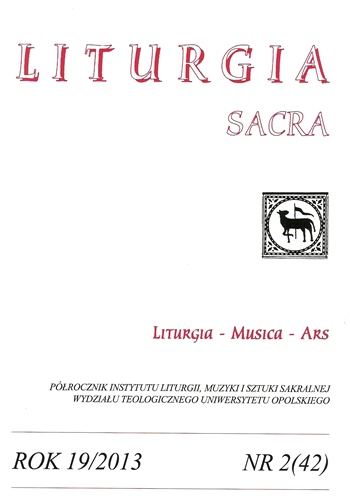Dydaktyka i badania liturgiczne po ogłoszeniu Konstytucji o Liturgii świętej Sacrosanctum concilium
Teaching and Liturgical Studies After Publishing the Constitution on the Sacred Liturgy Sacrosanctum Concilium.
Selected Topics
Author(s): Andrzej ŻądłoSubject(s): Christian Theology and Religion, Theology and Religion
Published by: Uniwersytet Opolski
Keywords: Constitution on the Sacred Liturgy; Sacrosanctum Concilium; Liturgical Studies
Summary/Abstract: The paper entitled as above is devoted to teaching and liturgical research, which since publishing the constitution Sacrosanctum Concilium in 1963 developed and got strengthened in Poland in the past 50 years. The aim of the author of this article was to indicate the issues mentioned in the title rather than a comprehensive study of the said phenomena, as it is broad and multi-dimensional, and calls for much more in-depth studies that the one that can be presented in an article published in an academic magazine.The article tackles issues fixed and approved by the second Vatican Council, which to a large degree has been prepared and inspired by pre-conciliar initiatives of a liturgical movement and which bears fruits in terms of a new understanding of the liturgy, its celebration and participation in it. Due to the fact that since the last Council our perception of the liturgy has changed, the same applies to the way the liturgy is treated and taught in the conciliar documents. Also, we face a new way of teaching liturgics not only in seminars, but at theological departments as well, which starting from the mid 90s of the last century (and ending in 2003) became present in the structure of Polish state universities (although none of the theological departments removed during the times of the Polish People's Republic has been restored at the universities). In the analysed after-conciliar 50 years the number of theological schools of the academic level grew considerably. Therefore liturgical didactics became more intense. Liturgical research, including detailed issues and aspects, became more popular. Scientific approach to the liturgy (liturgics) is nowadays treated differently than before the II Vatican Council. It is perceived as equal to other theological fields, and more and more frequently one emphasises the need of a liturgical focus on the entire theology which in its nature is „liturgical”, since it is in the liturgy where theology reaches its final momentum and it is there where it derives is vitality and sense from.The major conclusion emerging from the article seems to be the well prepared Polish academics dealing with liturgics. The fact is, that 50 years after the announcement of the constitution Sacrosanctum Concilium every Polish liturgical department is chaired by independent researchers, namely professors and „dr hab.” (often employed as professors specialising, apart from few cases, in liturgics). Therefore the postulate, or even the conciliar and postconciliar requirement according to which lecturers in liturgics should have academic degrees in liturgics is indeed implemented. On the other hand, a solution that stimulates one’s reflection is a visible fact, that in some cases departments of liturgics (it applies especially to theological departments at the State universities) are not solely „liturgical”, but — in line with their name — comprise other teaching and research fields, such as, for example, homiletics, hagiography, sacred music, pastoral theology, or even social science.
Journal: Liturgia Sacra
- Issue Year: XIX/2013
- Issue No: 42
- Page Range: 253-275
- Page Count: 23
- Language: Polish
- Content File-PDF

